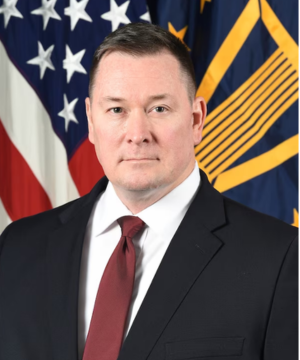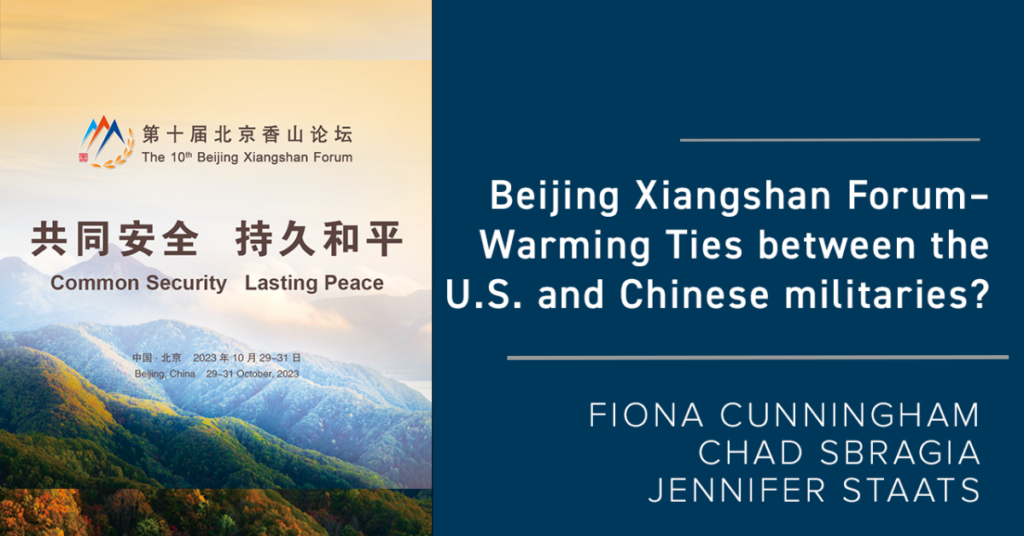Thursday, November 16, 2023 | 2:00 PM EST
Zoom Interview | Chad Sbragia, Fiona Cunningham, Jennifer Staats
The Beijing Xiangshan Forum, a high-level security and defense gathering, was convened from October 29 to 31 for the first time since 2019, with the theme, “Common Security, Lasting Peace.” Delegates from over 40 countries, including the United States and Russia, attended. What took place? What is the U.S. attitude toward the forum? What is the mood after the long gap in mil-to-mil communication since former Speaker Nancy Pelosi’s 2022 Taiwan visit? What were the achievements of the forum; will it lead to a thaw between the two militaries?
In a conversation moderated by Jennifer Staats on November 16, 2023, Chad Sbragia and Fiona Cunningham, who both attended the 2023 Xiangshan Forum, offer insiders’ views on the proceedings of China’s top annual security forum and discuss its significance.
Speakers

Chad Sbragia
Mr. Chad Sbragia served as the deputy assistant secretary of Defense for China in the Office of the Assistant Secretary of Defense for Indo-Pacific Security Affairs, Office of the Secretary of Defense, from 2019 to 2021. He was responsible for advising senior leadership within the Department of Defense on all policy matters pertaining to the development and implementation of defense strategies, plans, policies, and bilateral security relations for China.
Mr. Sbragia served in the U.S. Marine Corps from 1985 to 2012, including an assignment as the U.S. Marine Attaché, U.S. Embassy Beijing, where he steered U.S.-China military relations and negotiated bilateral agreements on recovery of U.S. personnel and the Defense Telephone Link.
Mr. Sbragia attended Arizona State University, the Naval Postgraduate School, the Defense Language Institute, and studied Chinese at Capital Normal University in Beijing.

Fiona Cunningham
Fiona Cunningham is an assistant professor of political science at the University of Pennsylvania. Her research interests lie at the intersection of technology and conflict, with a focus on China. Dr. Cunningham’s current book project explains how and why China threatens to use space weapons, cyber attacks, and conventional missiles as substitutes for nuclear threats in limited wars. Her research has been published in International Security, Security Studies, The Texas National Security Review, and The Washington Quarterly, and has been featured in the New York Times and the Economist.
Dr. Cunningham received her Ph.D. in political science from MIT. She holds a BA from the University of New South Wales and an LL.B. from the University of Sydney, both with first-class honors. From 2019 to 2021, she was an assistant professor of political science and international affairs at George Washington University.
Moderator

Jennifer Staats
Jennifer Staats is the director of East Asia and Pacific Programs at the U.S. Institute of Peace. She joined USIP in 2016 as the director of the China Program, and she continues to lead USIP’s work on China. She also oversees USIP’s programs in Northeast Asia, Southeast Asia, and the Pacific Islands. Dr. Staats previously served as director for advanced capabilities on the National Security Council staff, working with allies to enhance peace and security in the Indo-Pacific. She also spent several years working in the Office of the Secretary of Defense, where she focused on policy issues related to Asia.
Dr. Staats received her doctoral degree from Harvard University, her master’s from Princeton University, and her bachelor’s from the University of the South (Sewanee). She has been named a Fulbright Scholar, NSEP Boren Fellow, Javits Fellow, Rosenthal Fellow, a National Committee on U.S.-China Relations Public Intellectuals Program fellow, and NCAA Postgraduate Scholar. She is a life member of the Council on Foreign Relations.


